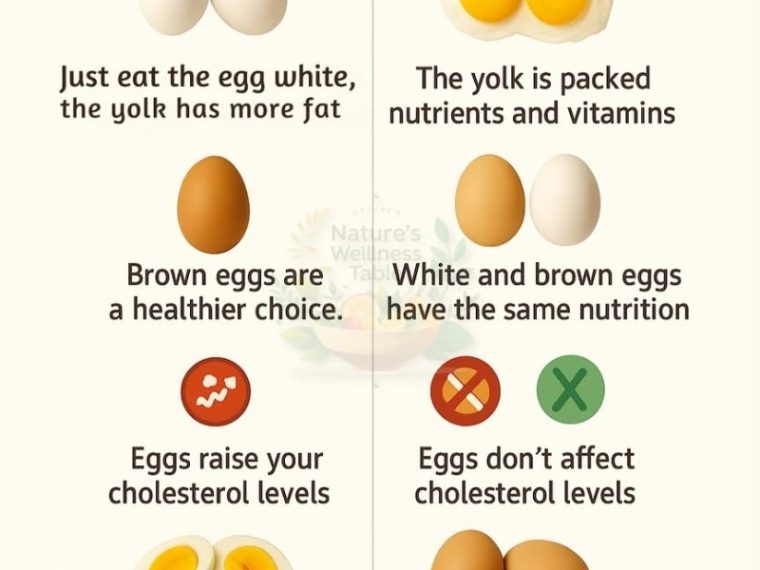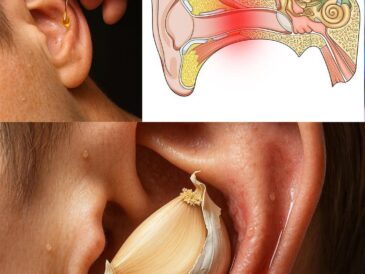These common myths might surprise you — and the facts could change the way you eat! 🌱✨
Save this post to remember the REAL egg facts
Eggs are one of the most common foods in our diet — yet they’ve also been the subject of many myths and “old wives’ tales”. In this article, we’ll crack open some of the most persistent egg myths and set the record straight with what the research actually shows.
🥚 Myth #1: “Eggs are bad for your heart / too much cholesterol”
The myth: Because eggs contain cholesterol (about 200 mg in the yolk of a large egg), many people believe eating them regularly will raise blood cholesterol and increase heart-disease risk.
The fact: Studies show that for most healthy people, the dietary cholesterol in eggs has only a weak effect on blood cholesterol levels. (The Nutrition Source) The key factor for cardiovascular risk is more about saturated and trans fat in the overall diet than the cholesterol from eggs alone. (Australian Eggs) The Harvard School of Public Health notes that eating up to one egg per day does not appear to increase heart-disease risk in healthy individuals. (burnbraefarms.com)
Takeaway: If you’re healthy, eggs can be part of a heart-friendly diet. But if you have certain conditions (e.g., familial hypercholesterolemia, certain cardiovascular issues) you should still consult your healthcare provider.
🥚 Myth #2: “You should only eat egg whites — avoid the yolks”
The myth: The yolk is “unhealthy” because it carries all the fat and cholesterol, so many skip it and eat just the whites.
The fact: While the whites do provide high-quality protein with little fat, most of the vitamins, minerals and beneficial nutrients (including choline, lutein/zeaxanthin for eye health, and fat-soluble vitamins) are concentrated in the yolk. (PMC)
Takeaway: If you skip the yolk, you may miss out on key nutrients. If fat or calorie intake is a concern, you could balance by combining whole eggs + extra whites.
🥚 Myth #3: “Brown eggs are better / more nutritious than white eggs”
The myth: Because brown often equals “more natural” or “healthier”, people assume brown-shelled eggs are superior.
The fact: Nutritionally, white-shelled and brown-shelled chicken eggs are virtually identical. (pgslot.team) The shell colour is simply determined by the breed of hen and has little to do with nutrient content.
Takeaway: Choose eggs based on price, freshness, or production method (free-range, organic, etc) — not shell colour.
🥚 Myth #4: “The date on the egg carton is the safety expiration”
The myth: Many assume once the “sell-by” or “use-by” date passes, eggs must be thrown out.
The fact: In many regions, the date is more about quality (freshness) rather than safety. Eggs held properly in the refrigerator can still be safe after the date, as long as they don’t smell bad or show obvious signs of spoilage. (pgslot.team)
Takeaway: Store eggs in the coldest part of your fridge (not the door, where temperature fluctuates), check them visually or by smell before use if past date.
🥚 Myth #5: “Raw eggs are best / give you super-nutrition”
The myth: Some believe eating eggs raw (e.g., in smoothies) gives extra benefit or strength (think vintage “body-builder myth”).
The fact: Raw eggs carry higher risk of food-borne illness (e.g., from Salmonella infection) and the body absorbs their protein less efficiently than cooked eggs. (Wikipédia)
Takeaway: Unless the egg is pasteurised or prepared in extremely controlled conditions, it’s safer (and more bioavailable) to cook eggs thoroughly.
🥚 Myth #6: “Eggs need to be stored in the fridge door shelf”
The myth: Because many fridges have a special “egg shelf” on the door, people think that’s the best spot.
The fact: The door is not ideal — temperature fluctuates each time the door opens. The main body of the fridge is better for consistent cold storage. (Teladoc Health)
Takeaway: Store eggs in the main compartment of your fridge, in their carton, not on the door.
✅ Why Eggs Still Earn a Place on Your Plate
Beyond debunking myths, eggs deserve recognition for their nutritional value:
- One large egg gives around 6 g of high-quality protein, plus vitamin D, B12, choline (important for brain health) and more. (K-State Recherche et Extension Johnson)
- They’re relatively low-cost and versatile — a nutrient-dense option for many budgets.
- When included in a balanced diet (with vegetables, whole grains, healthy fats) they can support healthy meals.
📝 Practical Tips for Eating Eggs Smart
- Use whole eggs a few times a week — if you’re healthy and active, 1-2 eggs per day is reasonable.
- Pair with fiber-rich foods (e.g., veggies or whole grain toast) to make a balanced breakfast.
- Prefer gentle cooking methods (poached, boiled, scrambled with minimal fat) rather than heavy frying in lots of oil/butter.
- If you have specific health issues (e.g., heart disease, high cholesterol, diabetes) check with your doctor about how many eggs are right for you.
- If you buy specialty eggs (free-range, pasture-raised, organic) check that the pricing reflects production cost, not just marketing hype.
🧠 Final Thoughts
Eggs have been unfairly burdened with myth after myth, but when we look at the evidence, we find that most of the scary claims don’t hold up for healthy people. That said, nothing is “perfect” — your overall diet, lifestyle, and genetic background matter most.
So the next time you find yourself sorting through egg-label confusion, remember: shell colour doesn’t matter, the whole egg (white + yolk) offers value, dates on the carton are about freshness not immediate danger, and raw isn’t necessarily better. Enjoy your eggs — smartly.
Save this post so the next time someone tells you “eggs will raise your cholesterol!” you can smile knowingly and share the facts. 🥚✨





